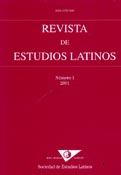Poliziano's Fabula di Orfeo: a contaminatio of classical and vernacular Themes
DOI:
https://doi.org/10.23808/rel.v1i0.87983Palabras clave:
fábula; contaminatio; poesía dramática.Resumen
La Fábula de Orfeo de Poliziano es un ejemplo excepcional de las transformaciones que se dan en la tradición clásica. Es una amalgama o contaminatio, principalmente de Virgilio y Ovidio, Petrarca, la égloga vernácula, y otros muchos elementos. Se ha discutido ampliamente a qué genero pertenece, cuestión que yo considero como sin demasiado sentido, debido a su carácter sui generis, una forma muy original de poesía dramática. Poliziano es un poeta diestro tanto en latín como en italiano, y en este caso él acierta en crear un extraordinario pastiche entre las dos, en una brillante ilustración de su concepción artística de la docta varietas. El objeto de este artículo es determinar y describir los diversos registros de la dicción y el estilo que hacen la pieza tan atractiva.
Descargas
Descargas
Publicado
Cómo citar
Número
Sección
Licencia
Derechos de autor 2001 Revista de Estudios Latinos

Esta obra está bajo una licencia internacional Creative Commons Atribución-NoComercial-SinDerivadas 4.0.
Los originales publicados en las ediciones impresa y electrónica de esta revista son propiedad de las personas autoras de los mismos y se podrán difundir y transmitir siempre que se identifique la fuente original y la autoría en cualquier reproducción total o parcial de los mismos, y siempre que no tengan una finalidad comercial.






